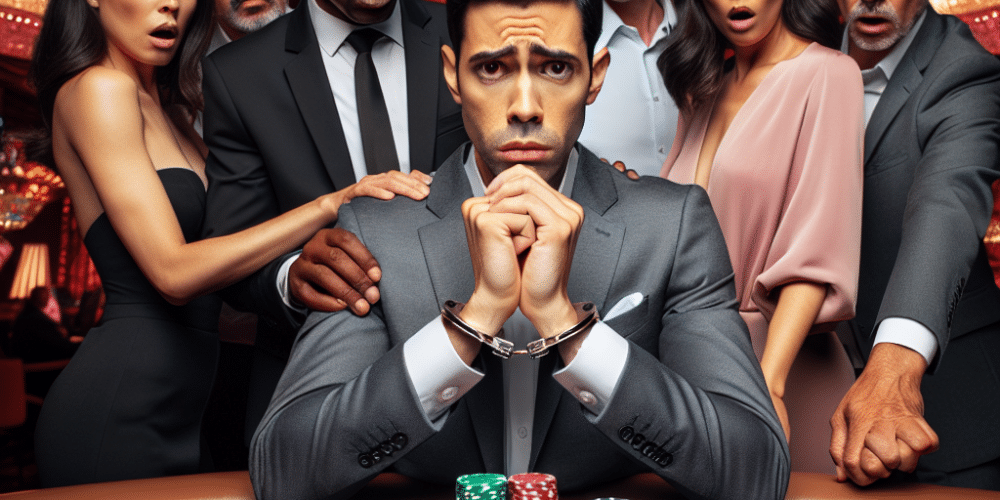Bing Du, a well-known figure in the poker community, was reportedly arrested during the prestigious World Series of Poker tournament held in Las Vegas last week. The charges leveled against him are serious; he is accused of operating an illegal brothel, which has sent shockwaves through both the poker world and the broader Las Vegas business community. This arrest has drawn significant attention, as it not only involves a prominent poker player but also raises questions about the underbelly of Las Vegas’s glitzy facade.
Las Vegas, long recognized as a haven for gambling and entertainment, is no stranger to controversy. However, allegations of illegal brothels operating under the noses of authorities bring a new dimension to the challenges faced by the city. The timing couldn’t have been worse; the incident occurred during one of the largest annual gatherings of poker professionals, enthusiasts, and media from around the world.
The World Series of Poker is not just a tournament; it’s an economic powerhouse for Las Vegas, drawing in thousands of visitors and generating millions in revenue for local businesses. Against this backdrop, Bing Du’s arrest raises concerns about the potential impact on the city’s reputation and its ability to host international events without incident. The poker community, already accustomed to the scrutiny of high-stakes games, faces new questions about the integrity and behavior of its players.
In the competitive world of professional poker, where players often engage in psychological warfare, the notion that one of their own could have been involved in such illicit activities adds a layer of intrigue and dismay. “It’s a wake-up call,” one player remarked, noting that the incident has prompted soul-searching within the poker community. The player, who wished to remain anonymous, expressed concerns that such behaviors could tarnish the image of poker as a sport of skill and strategy.
The Nevada Gaming Commission, responsible for overseeing the integrity of gambling activities in the state, has been quick to distance itself from the scandal. Representatives from the commission have emphasized that this is an isolated incident, not reflective of the broader poker community’s values. They are actively cooperating with law enforcement to ensure that those responsible are held accountable.
Yet, some industry insiders argue that the arrest highlights a deeper issue within the gambling hub: the blurred lines between legal and illegal activities. Las Vegas has long grappled with its dual identity as a city of legitimate entertainment and a magnet for more clandestine operations. Critics argue that the focus should be on strengthening regulations and enforcement, ensuring that the city’s reputation for both hospitality and legality remains unblemished.
In contrast, others believe that the emphasis should be on the individuals and choices made rather than the environment itself. A veteran poker analyst suggested that while Las Vegas may provide the backdrop, personal responsibility and ethical conduct remain critical. “Every industry has its outliers,” they remarked, pointing out that most poker players adhere strictly to the law and ethical guidelines.
The arrest has also sparked debates about whether the intense pressure and high stakes of professional poker contribute to risky behavior among players. The lifestyle associated with successful poker careers, characterized by high earnings, fame, and constant travel, might lead some to make poor decisions. There is a growing conversation about the need for better support systems and resources to help players manage the psychological and emotional demands of the game.
Meanwhile, Bing Du’s legal team has remained tight-lipped about the specifics of the case, focusing on defending his character. They argue that their client is being unfairly targeted due to his prominence in the poker community. The defense suggests that there is a lack of concrete evidence linking Du to the alleged illegal activities, and they are preparing for a robust legal battle.
As this case unfolds, it underscores the complex relationship between Las Vegas’s glamorous outward appearance and the challenges lurking beneath. The city’s economy relies heavily on its image as a destination for entertainment, and any scandal risks undermining that carefully cultivated allure.
The broader implications of this incident are yet to be fully understood. Will it lead to stricter oversight and more rigorous enforcement in Las Vegas? Or will it serve as a cautionary tale for those in the poker world who might stray too close to the edge? Only time will tell if this serves as a catalyst for change or if it becomes just another footnote in the city’s storied history.
In the meantime, the poker community continues to gather around the tables, with players shuffling cards and placing bets, aware that their world remains under the watchful eyes of both fans and critics. As the dust settles, the focus will inevitably shift back to the game itself – the strategies, the bluffs, and the storied rivalries that have made poker an enduring spectacle. However, the shadow of Bing Du’s arrest will loom large, a reminder of the ever-present tension between risk and reward, legality and the lure of the illicit, in the heart of the city that never sleeps.

















